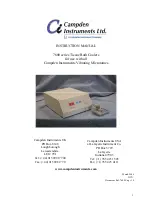
Files to be recorded
• Recording many small files.
• Damaged source files (data loss).
• Trying to record files in use by the system or other applications.
Other
• Copying from a CD that is scratched, dirty or damaged.
• Recorder malfunction.
Checks/Prevention
• Defragment your hard drives at least once a week.
• Do not record across a network. Copy desired files to your local hard drive.
• If your source hard drive is more than five years old, make sure it does smart thermal recalibration
(contact your hard drive manufacturer for more information).
• Record at a slower speed.
• It may be necessary to write audio at slower speeds than those you can achieve for data, since writing
CD-DA audio requires streaming more bits per second to the
RipGO!
device.
• Keep the CDs, the recorder and your source CD-ROM drive free of dust.
• Do not try to copy empty directories, zero byte files, or files that may be used by the system at the time
of recording.
• If your data includes more than 10,000 very small files, create a disc image first, or record at a
slower speed.
• The temporary directory should always have space free at least twice the size of the largest file you
are recording.
• The entire computer, from the motherboard bus to the
RipGO!
device itself, needs to be configured
properly for faster recording and highest maximum sync transfer rate.
Errors recording at 4x speed on a Macintosh using the RipGO! device
This is a buffer underrun error caused by the Macintosh constantly polling the keyboard and mouse. As
a result, the flow of data from the source (e.g., hard drive) is not able to supply the data to the
RipGO!
device at a fast enough rate for 4x operation. Select the 2x operation in the menu of NeroMAX to avoid this
problem.
32
Device User’s Guide
Imation






































